LESSONS IN EQUITY
‘Fight the real enemy’ — Political school tackles xenophobia, one movement at a time
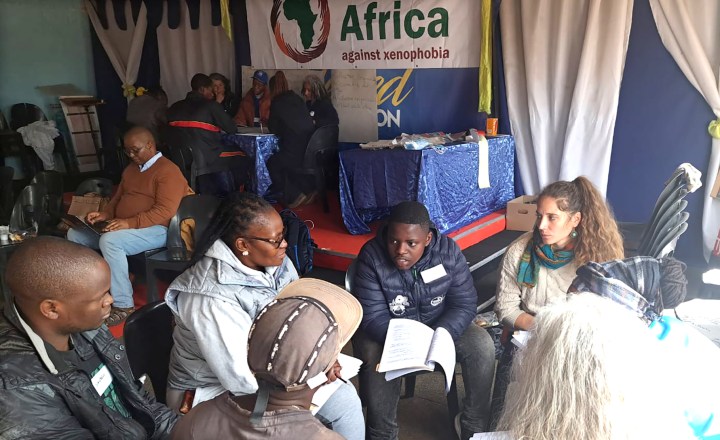
Kopanang Africa Against Xenophobia hosted a three-day political school to build a progressive movement against xenophobia. Attended by several civil society movements, the message was clear: sustainable movements start with knowing and combating the real enemy.
For three days, activists, members of civil society groups and residents gathered at the Sunrise Church in Thembelihle in the south of Johannesburg with one clear focus in mind: building a sustainable movement against xenophobia.
The brainchild of Kopanang Africa Against Xenophobia (KAAX), the political school was attended by members of organisations including Lawyers for Human Rights (LHR), Equal Education (EE) and the Treatment Action Campaign (TAC).
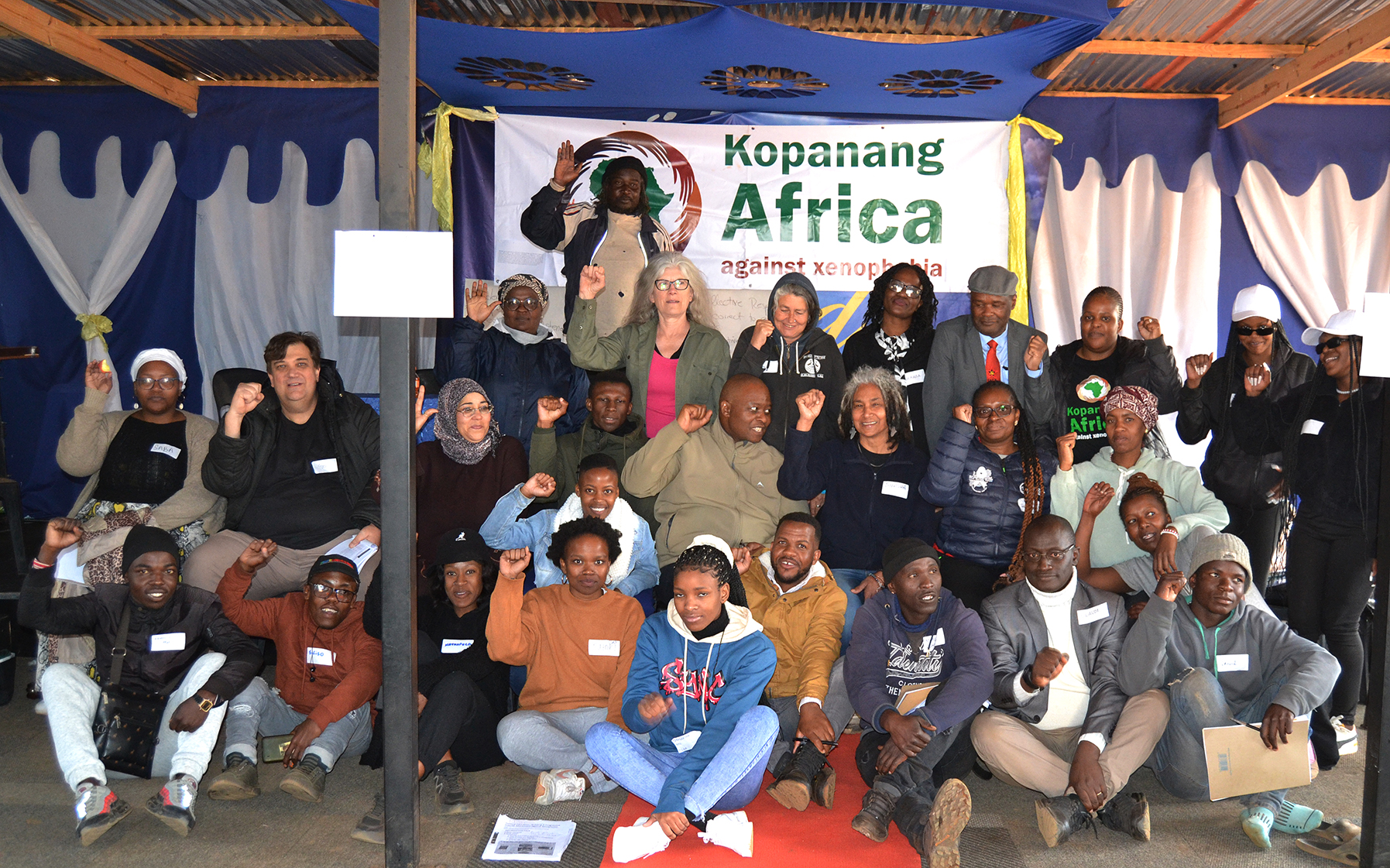
Kopanang Africa Against Xenophobia hosted a political school aimed at building a progressive movement against xenophobia. (Photo: Lerato Mutsila)
With myriad activities and discussions designed to challenge participants’ beliefs about foreign nationals, the school aimed to unpack the roots of xenophobia, assess how to put power back in the hands of the people and create a strategy to challenge how power is divided in society.
A common thread arose during the workshops: migrants, refugees and asylum seekers are continually scapegoated while “the real enemy” remains unchallenged.
SA’s fraught history of xenophobia and xenophobic attacks
The Institute of Security Studies revealed that since 2021, attacks against foreign nationals living in South Africa have increased. The country has also seen a mushrooming of anti-migrant groups like Operation Dudula and #PutSouthAfricaFirst.

KAAX political school facilitator Shabathi (Saba) welcomes activists and civil society group members on the opening day of the political school. (Photo: Lerato Mutsila)
The Human Sciences Research Council’s 2021 round of the South African Attitudes Survey found that most SA citizens see foreign nationals as a threat. Many believe the nation’s overwhelming socioeconomic problems can be traced back to unfettered migration and South Africa’s porous borders. The general view is that migrants, documented or otherwise, are stealing jobs, school placements and other sought-after and scarce resources.
Such figures show the dire need to create a movement to tackle anti-migrant sentiments. One of the facilitators of the political school, Mazibuko Jara, from Zabalaza Pathways Institute, said, “We need the mass of ordinary people to act to change the country for the better. The conditions we have are dire for the majority of the people. It is these conditions that enable powerful people to whip up xenophobia as a scapegoat that deflects attention from the causes of our dire conditions.”
Identifying the root of the problem
The government has often been taken to task by civil society for its response to xenophobia and the attacks against foreigners in the country. The United Nations added its voice to the sea of criticism in 2022, calling for the government to curb the scapegoating of foreign nationals.
The UN’s warning came after the government established a National Action Plan to combat Racism, Racial Discrimination, Xenophobia and Related Intolerance in 2019.
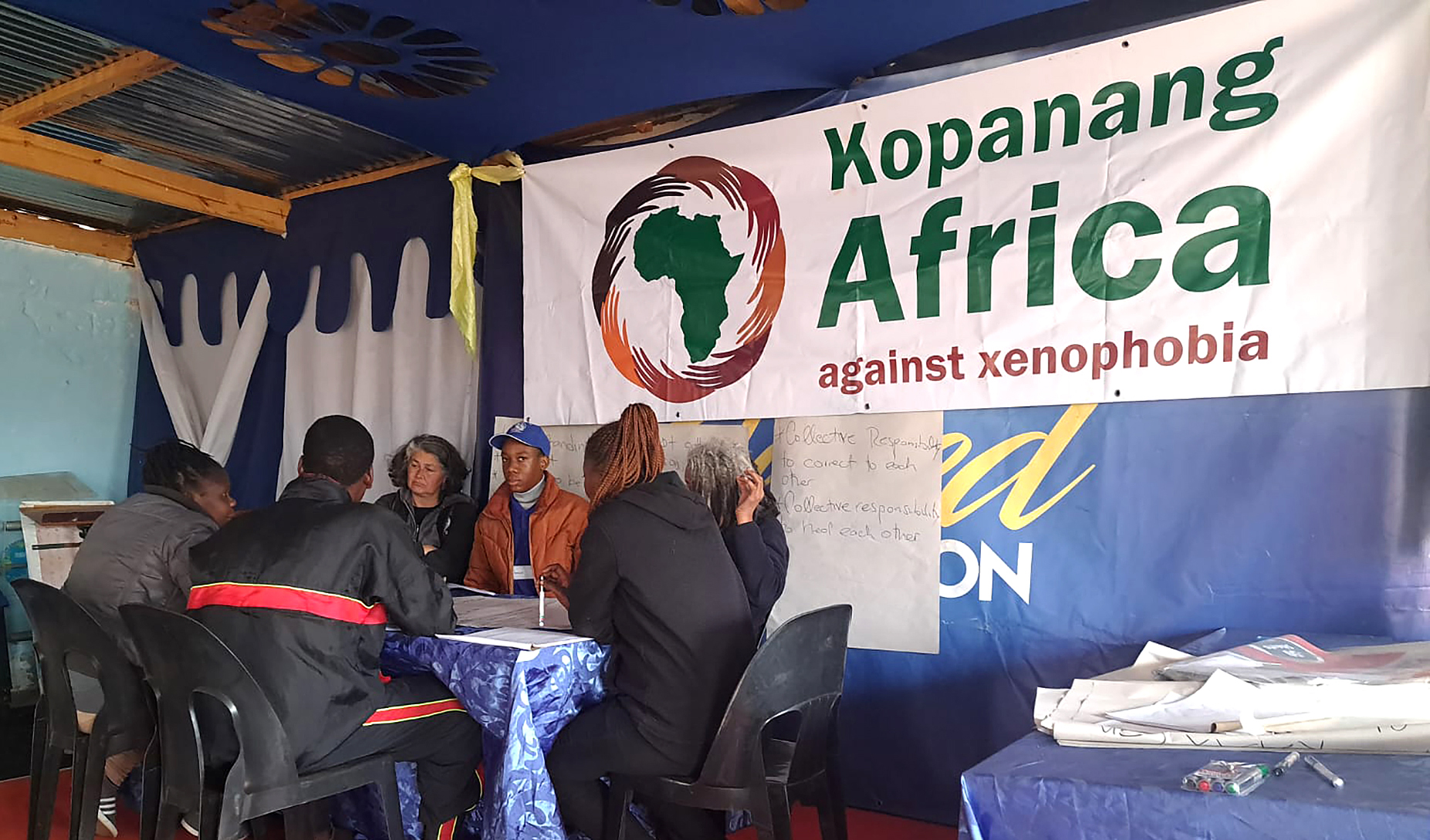
KAAX political school participants. (Photo: Lerato Mutsila)
A report, released in February 2023, offered few solutions other than recommending the implementation of an early warning system (EWS) while claiming that the task would “tax the capabilities of the state, which is facing both budgetary restrictions and a marked dearth of technical and organisational capabilities to implement such a system”.
Another report was released indicating that the government planned to develop a rapid response mechanism based on the EWS to respond to incidents of racist and xenophobic incidents.
Speaking to the participants, Sharon Ekambaram, the head of the Refugee and Migrant Project at Lawyers For Human Rights, said that while discussions at the political school centred on identifying and defining xenophobia, it worried her that the roles of government and the private sector in the crisis were overlooked.
“We spoke a lot about many things, but powerful actors were left out. For me, it really spoke to something that the state and the private sector have done successfully. They have blocked themselves off and we don’t know that they are singing all the way to the bank, making excessive profits, while we remain poor,” Ekambaram said.

A participant in the KAAX political school reads through an activity on building movements against xenophobia. (Photo: Lerato Mutsila)
Jara expanded on the list of the entities who benefit from xenophobia and want to keep it in place, named “the enemy” throughout the political school discussions.
The facilitator claimed the following were at fault: “Big business who own the economy, because they have failed to invest in infrastructure, jobs and human development. They take profits for a few. They steal wages from workers. They keep a large number unemployed. Their greed produces the dire circumstances facing the majority of the people.
“The national and provincial governments for failing to use their power to change the people’s lives and redistribute wealth. Political parties for whipping up the dirty muck of xenophobia. And most of the media for reinforcing the othering of migrants.”
Sibongile Tshabalala, the Gauteng chairperson of the TAC and a participant in the political school, pointed a finger at the government for stoking xenophobic sentiments.
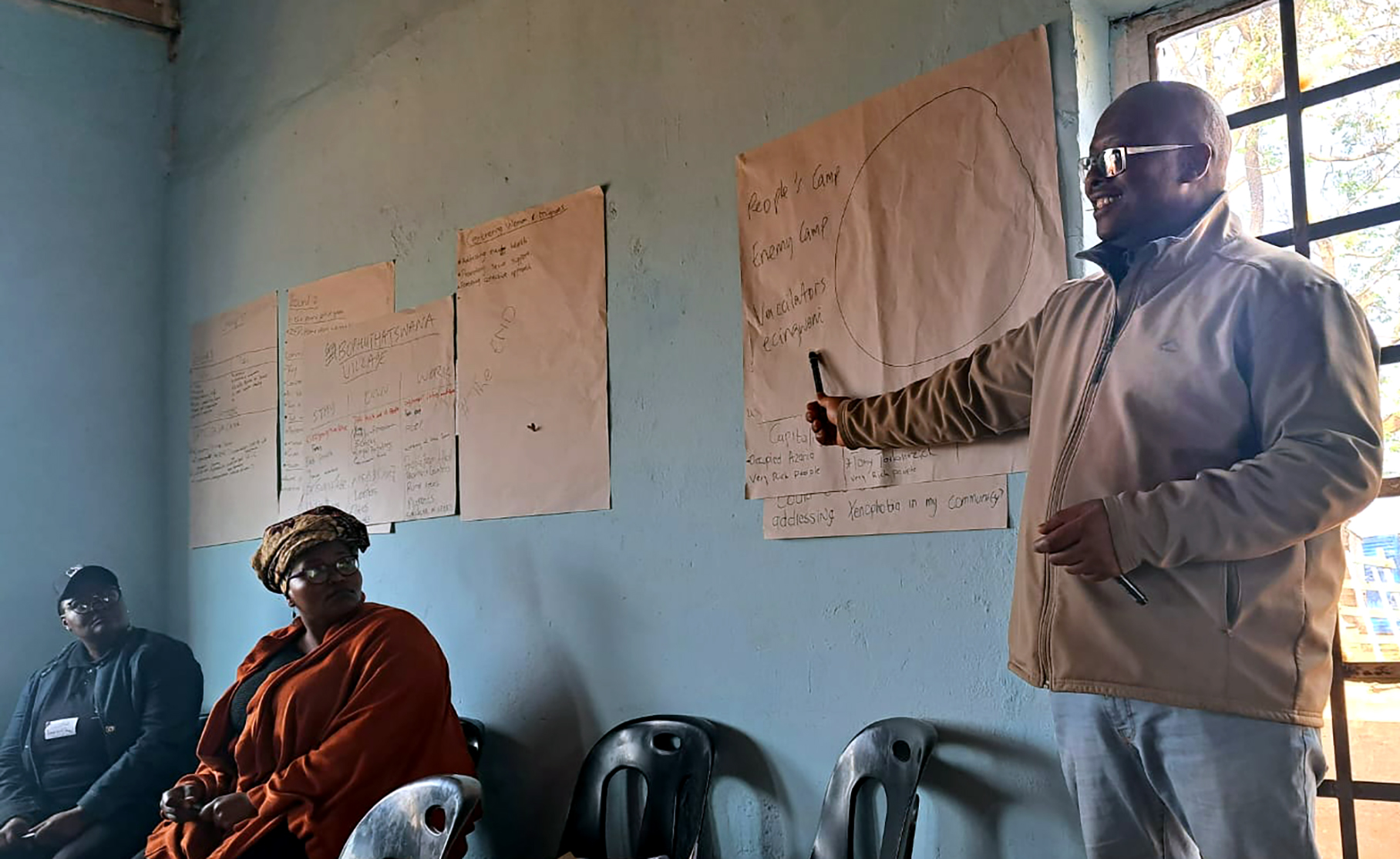
Mazibuko Jara from Zabalaza Pathways Institute talks to participants about how power is divided when tackling social issues. (Photo: Lerato Mutsila)
“The government wants to use the poor against the poor to cover their corruption. I once told the minister of home affairs, ‘I hear what you are saying about migrants supposedly messing up the country, but who allowed them in? It’s you and your government. It’s your government that does not have systems in place to control all of these things,” Tshabalala said.
The way forward
While a wellspring of ideas was exchanged, the political school’s vision of creating a long-lasting movement against xenophobia hinges on whether the participants act on the lessons they learnt.
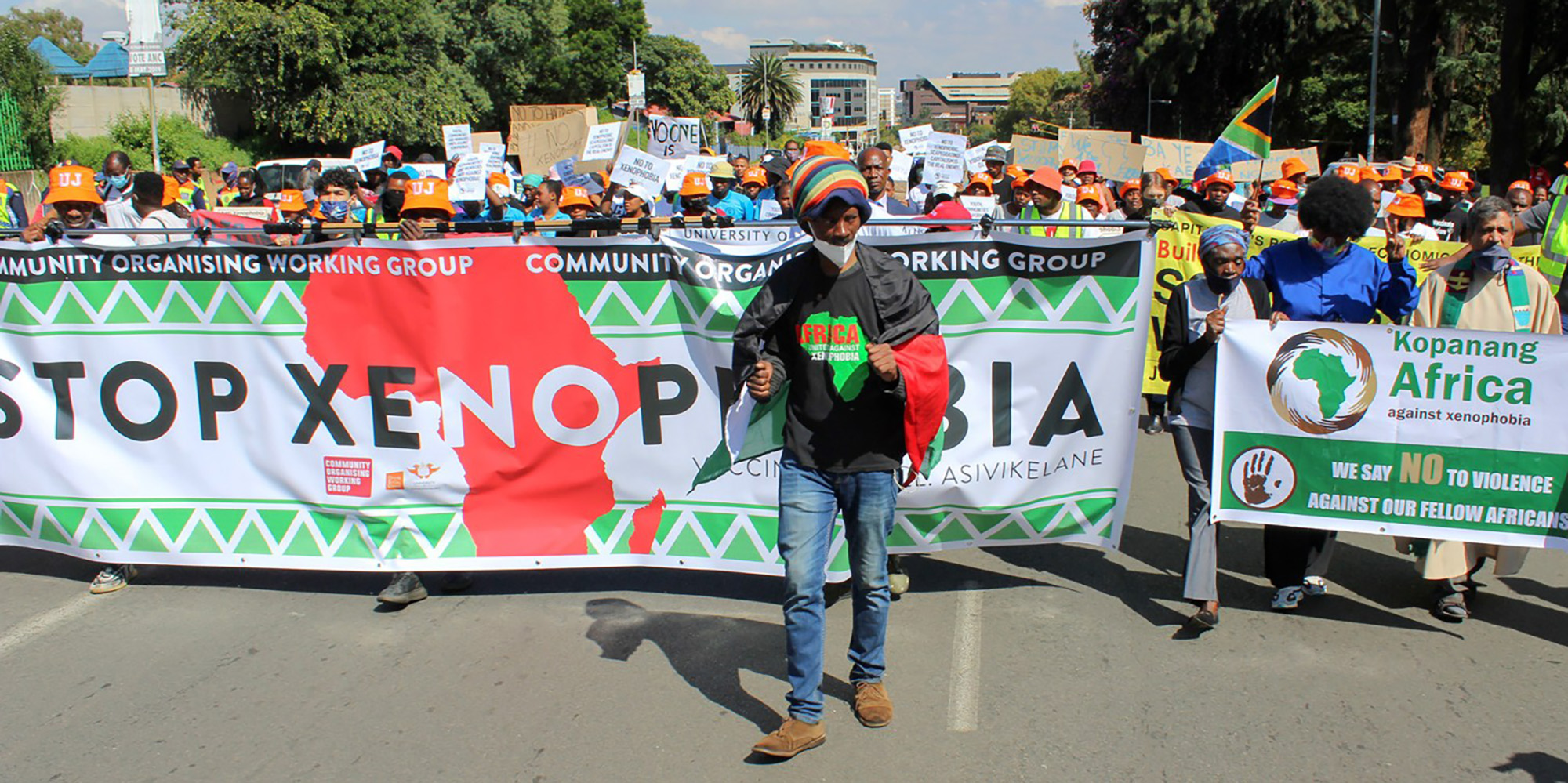
Members and supporters of Kopanang Africa Against Xenophobia march through Johannesburg to protest against xenophobia in South Africa on 26 March 2022. (Photo: Tamsin Metelerkamp)
Mathapelo Dlala, a volunteer facilitator at Equal Education in Daveyton, said, “I will definitely carry what I learnt here in the spaces that I work in. In the organisation I work for, we vouch for equality, and fighting xenophobia has to do with equality. I want to put it out there in the schools we organise in and teach the learners about xenophobia.”
Jara said, “Ordinary people are the ones who can stop this scapegoating and point to the real causes of unemployment, poverty and poor service delivery. They cannot do this without collective power and common people’s voices with a shared outlook, acting in unison. For that, a strong, long-lasting impact full movement is key. KAAX is the beginning step in the long journey to build such a movement.” DM





















 Become an Insider
Become an Insider
Comments - Please login in order to comment.